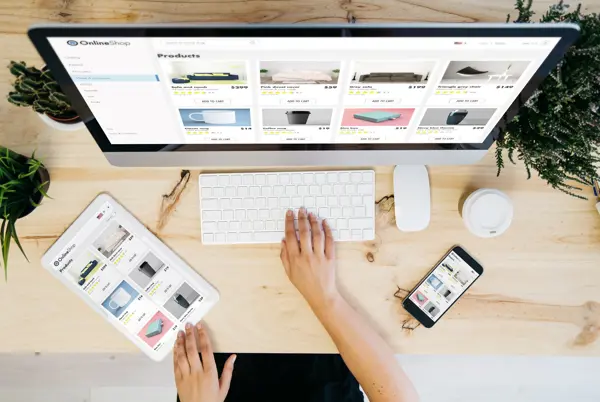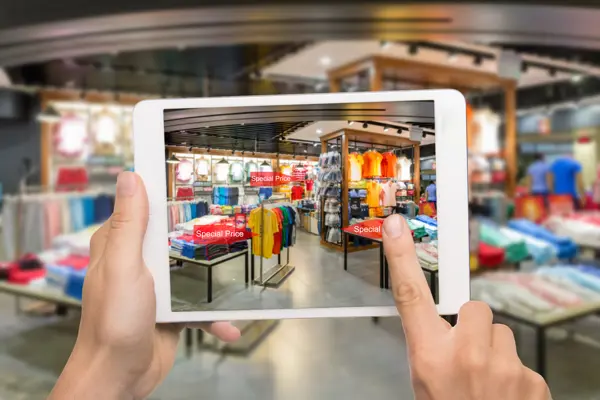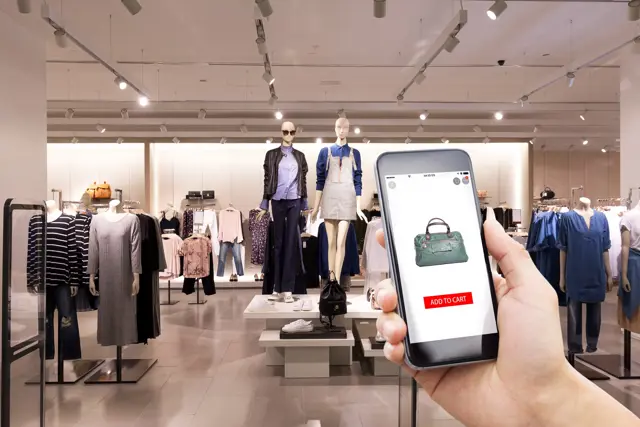Get more Retail Sector insight from HSO
Dynamics Matters Podcast: Ep 13 - Lessons from a Retail CEO
With special guest Siegfried Horn, Director of Retail and Distribution, HSO Germany
✔ How was it to work as CEO of a large German retailer?
✔ How retail has changed in the last 30 years?
✔ What is the most important to run a successful retail business?

Lessons from a Retail CEO
Transcript
Michael Lonnon
Welcome to the HSO Dynamics Matters podcast. Your regular sonic dive into the world of Microsoft technology-related matters and much more besides. I’m your host Michael Lonnon, and today I’m joined by my colleague Siegfried Horn, Director of retail and Distribution.
The reason I wanted to get Siegfried on the show is because as an ex. CEO of a large German retailer, I couldn’t think of anyone better to give an expert perspective on the most important thing retail leaders need to have front of mind in order to set them up for success. And Siegfried doesn’t disappoint.
So, grab a brew, sit back, relax, and enjoy the show.
Michael Lonnon
Shop in store or buy online?
Siegfried Horn
More and more I buy online. I’m not the shopping guy. My wife like this of course.
Michael Lonnon
Are you happy doing it all online?
Siegfried Horn
Yeah, I do. Sometime it’s unbelievable. I do the most with Amazon. It’s the easiest way.
Michael Lonnon
Lining Jeff Bezos’s pocket with money.
Siegfried Horn
Absolutely.
Improving Online Operations For The Retail Store
E-Commerce retailing has grown rapidly in recent years. It surged ahead in the Covid pandemic and then slipped backwards when the pandemic ended. Even so, online volume is significantly higher than it was before the pandemic. The largest part of the gains made during Covid were kept. One benefit of the pandemic was to accelerate the omni-channel aspects of retailing.

Michael Lonnon
Someone’s doing well out of all this. Anyway, so I know you quite well Siegfried and I know that you’re an ex CEO of a large retail organisation, so I wanted to get you on the podcast because you are an expert in this area. When we talked before, we talked about your perspective or what the biggest challenges are, or at least what the most important things to know, as a retailer, particularly as a CEO. And I would love to get your thoughts on that. So the first question is, from your perspective, what is the most important thing to know, as a retailer in terms of running a successful business?
Siegfried Horn
So for my side it’s three very important things. And it doesn’t matter what the first is, the second or the third. Omni channel is the first one. I started working in retail 30 years ago. And despite you have only one channel, you have a store, or you have a catalogue, now the customer expects to reach you on every channel. So that’s omni channel. And now you have to take care of all these channels in a parallel thing. The second one for me is know your customers, as Microsoft call it. Also 30 years ago, and Marks and Spencer in UK, didn’t know anything about a customer, they didn’t know the name, nothing. 20 years ago they started counting customers, so 1,000 come in and 200 and pay and there is the first KPI.
Michael Lonnon
How times have changed.
Siegfried Horn
The changes are coming from the market, changes are coming with internet. Most of my retail time was in mail order companies, and mail order companies know a lot about each customer because it’s very important to send them the catalogue and to get the invoice and so on. Mail order businesses have been building up customer data for nearly 100 years, so they know a lot about each customer. And now also IT has changed and it’s possible with a cloud solution to manage the applications and systems that capture the data. Today it doesn’t matter how many data you have.
Michael Lonnon
Do you think times have gotten better for the customer?
Siegfried Horn
For a customer, it’s better. Thirty years ago, you get a big catalogue with 1,000 pages. And then you have to take two to three hours to find the products you like. And what is coming now? It doesn’t matter whether you go with e-commerce, they know your buying history. And that’s becoming normal. This isn’t big brother. We’re talking about what’s real now. Retailers also know what you bought over the last 20 years. And then when you have a connected system, you can give them what they expected. So then you have a feeling and the customer come and say, oh, I think now he needs socks because he bought a shirt, something like this. Anticipating customer needs is very important for retailers in the moment.
Michael Lonnon
And that’s knowing your customer isn’t it, knowing enough about them to be able to offer things like that, knowing they bought one thing over here and be able to offer them something that’s similar that they you know they might like that’s a big change isn’t it?
Siegfried Horn
Yeah. I met the German CEO of Amazon more than 20 years ago. Often I laugh about him, because he’s a crazy determined guy, but in this time, Amazon had nearly 60/70 percent of their employees not in the warehouse, but in IT. And that’s what they show us. In the former time, the buyer was important, and the marketing and advertising was the biggest guys in the company. Now it’s getting more and more … the IT part will be the important part. But retailer last, so yesterday was the whole day by a retailer and most of them didn’t recognise this yet. So those who do not recognise this in the next few years, there will have problems from my side in the next 5 to 10 years.
6 Areas Where HSO Smart Retail Will Increase Customer Loyalty by a Minimum of 10%
In this article, we’ll talk about technology trends we’re seeing in the retail industry and why implementing some of these strategies will result in a minimum 10% increase in customer loyalty. After all, we know that on average, it costs 5 times more to acquire new customers than to retain existing customers and that a simple 5% increase in customer retention can increase profits by 25% to 95%.

Michael Lonnon
You think in the next 5 to 10 years, if they haven’t recognised that, then they’re not going to be able to serve the needs of the customer very well?
Siegfried Horn
This is what the sad part is. Because especially smaller or mid-size retailers in Germany, I think it’s the same UK or Netherland, still don’t have a good IT system. Some have two or three smaller ERP systems. They have no CRM, and most of them have a shop but is the shop integrated into the IT landscape? I think they realise it must be done. And that’s the first step for most of them. Sometimes we assume, in the consultancy practice, this is already done. Then you go to the market and see more than 50% of the retail in Germany need ERP modernisation in the next few years, you realise it’s not.
Michael Lonnon
Do you think most retailers recognise the need to change? Do they recognise they have a problem with serving the needs of customers because they have siloed information or they have siloed systems?
Siegfried Horn
I think most notice … since last year, Corona showed most of them that it’s not possible to be a good and successful retailer with a future without IT. There’s still some small retailers in the cities which today have good products, good assortment and make very good consulting for the customer but without IT you have no chance for the future.

Is your retail business data rich but analysis poor?
In 10 minutes, this whitepaper shows you how to have only one version of the truth (data) and make the right decisions for your retail business.
Michael Lonnon
It’s strange isn’t it because Coronavirus has caused such havoc and pain but actually it’s been the catalyst to show many organisations there is a need to change. So some positive has come from it.
Siegfried Horn
You need an idea, and you need a goal for your IT landscape. Yeah, you have to be very good IT structure. That’s very important and I think a lot of them have not. So, in former times, IT was only cost. Cost, cost, cost. Now for me IT is the enabler of future success. And I think this is maybe by 50 or 60% of the retailers in the mind not by the rest.
Michael Lonnon
Which leads me on to the next question, which is, so if you’re a retailer who recognises the need to change, needs to transform, the need to digitise, how will they do that?
Siegfried Horn
A good first step, as I already taught is to make a good IT landscape, IT architecture. And the second very very important thing is to change their mind, to change their attitude. And they all say the customer is in the middle of my story, and so on. But now it’s more and more, know your customer, as I say already. So you have not to think about what is the right thing for the channel, let’s say for e-commerce or for my store or for my catalogue. No, you must think what the right thing for my customer is.
The customer is in the middle, absolutely in the middle. And you have to think what does the customer need? What does he or she need now or need next week? And what is expected from our side? Now customers know much more, they go on the internet and use Google and say, ‘oh, I’m looking for a cup for coffee’, then get 100 offers. So you have to use all the data you have on the customer. What Amazon shows you since monitoring more than 20 years, is that the better you know your customer the more predictive you can be. Now you can say about machine learning or AI, or data analytics that that is was in former times only to the mail order companies. And not a not a retailer, not to stores in the cities. So now we have to do the hustle to send the right offer at right time.
Why you should never postpone your CRM project
Postponing your CRM project is a very bad strategic decision… In this blog I will explain why.
In times of economic uncertainty, many companies review and re-prioritise major investments, especially in IT. Although this is understandable, it also comes with risks, yet, quite often, not delivering on your major projects can create even more risk. When times get tough, it’s even more important to have insight and to carefully manage pipeline, opportunities, customer data and relations. Therefore CRM is a critical business system and every month delayed is a delay to improved sales performance and revenue growth.

Michael Lonnon
Twenty years ago 60-70% of Amazon’s staff were IT. This is because they realised the focus on knowing the shopping habits and buying preferences of each customer was the future and was underpinned by technology.
Today we refer to this as simply knowing your customer. And many manage customer information well, for a consumer like you and me it’s almost become an expected standard, but there are still businesses out there who struggle to do it well.
Siegfried believes that retailers unable to improve this in the years ahead will struggle to serve customers well and compete. And that to bring about the required shift, often a mind-set change is required. Bringing the customer experience central to the delivery of products and services.
